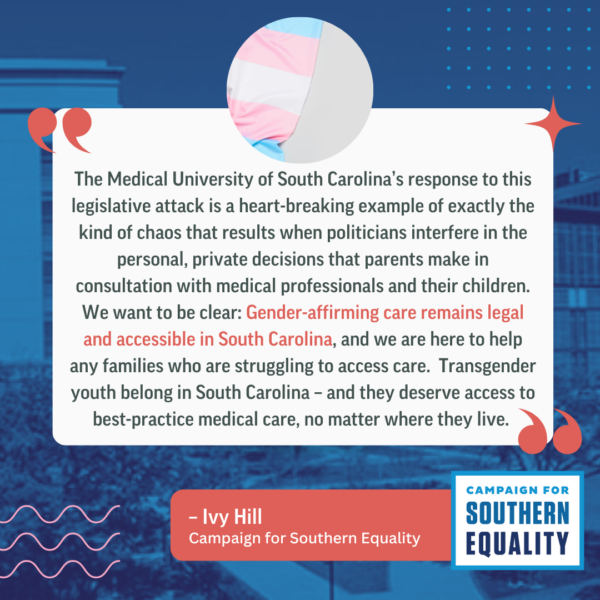 Today, new reporting from ProPublica details the far-reaching impacts of a South Carolina budget proviso passed in 2022 that targeted the Medical University of South Carolina (MUSC) and threatened the institution’s state funding if it continued providing gender-affirming care to transgender people under 16 years old. In response to the proviso, MUSC stopped providing care to all transgender young people, over complying with the new restriction and forcing hundreds of families to seek care elsewhere in the state.
Today, new reporting from ProPublica details the far-reaching impacts of a South Carolina budget proviso passed in 2022 that targeted the Medical University of South Carolina (MUSC) and threatened the institution’s state funding if it continued providing gender-affirming care to transgender people under 16 years old. In response to the proviso, MUSC stopped providing care to all transgender young people, over complying with the new restriction and forcing hundreds of families to seek care elsewhere in the state.
Ivy Hill (they/them pronouns) is the Gender Justice Director at the Campaign for Southern Equality (CSE) and lives in Piedmont, SC. They said today:
“The Medical University of South Carolina’s response to this legislative attack is a heart-breaking example of exactly the kind of chaos that results when politicians interfere in the personal, private decisions that parents make in consultation with medical professionals and their children.”“We want to be clear: Gender-affirming care remains legal and accessible in South Carolina, and we are here to help any families who are struggling to access care. In partnership with the SC United coalition, we’re also doing everything we can to fight back against further restrictions on healthcare that far-right lawmakers are pursuing in South Carolina. Transgender youth belong in South Carolina – and they deserve access to best-practice medical care, no matter where they live.
Today’s article about MUSC’s cessation of care for transgender youth is the latest troubling example of “overcompliance” with bans on medically necessary healthcare for transgender youth. This overcompliance compounds the harms of the bans well beyond the letter of the law. A recently-published memo from the Campaign for Southern Equality details these emerging patterns of overcompliance.
South Carolina is among a small number of Southern states that does not have a statewide law restricting medically necessary healthcare for transgender youth. Several ban bills were debated in the SC legislature in 2023 but failed to pass, experiencing significant opposition from the public and from legislators. Additional extreme bills have been pre-filed for consideration in the 2024 legislative session. The SC United for Justice and Equality coalition, representing more than 30 LGBTQ+ organizations across the state, is leading efforts to defeat these and other anti-LGBTQ attacks.
After the 2023 legislative session, an estimated 90% of transgender youth in the South live in a state that has passed a ban, and half of those bans are in effect right now. Click here for a map of where bans have passed and where they are in effect or on hold pending litigation. Throughout 2023, CSE has led the Southern Trans Youth Emergency Project, which serves as a resource center for families, helping them access out-of-state healthcare options so their child can continue to receive uninterrupted care, and providing travel grants of $500 to defray the financial burdens resulting from these bans. CSE has distributed more than $30,000 in direct travel grants to more than 600 families and individuals in twelve Southern states. STYEP is currently serving 83% of transgender youth nationwide who live in a state with a ban.
CSE is proud to be a leading member of SC United for Justice and Equality, which envisions a state where everyone can thrive, with a focus on the lived and legal equality of LGBTQ people. The coalition advocates for the passage of legislation to protect LGBTQ community members and opposes anti-LGBTQ legislation. The coalition also works on intersecting issues of social justice, including racial justice, reproductive justice, voting rights, and health care access.

